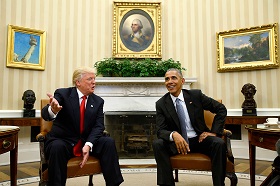What decisions can we expect from Donald Trump’s new team on the Middle East? The further aggravation of the situation in Syria, the U.S. policy with respect to its allies as well as the problem of the Iranian nuclear programme all remain highly topical issues on the Middle East agenda. Vasily Kuznetsov, RIAC expert and Director of the Center for Arab and Islamic Studies at the Institute of Oriental Studies at the Russian Academy of Sciences, outlines the new U.S. policy in the Middle East.
What decisions can we expect from Donald Trump’s new team on the Middle East? The further aggravation of the situation in Syria, the U.S. policy with respect to its allies as well as the problem of the Iranian nuclear programme all remain highly topical issues on the Middle East agenda. Vasily Kuznetsov, RIAC expert and Director of the Center for Arab and Islamic Studies at the Institute of Oriental Studies at the Russian Academy of Sciences, outlines the new U.S. policy in the Middle East.
Donald Trump’s election as U.S. president was a complete surprise to everyone: the American political establishment, the diplomatic establishment and the expert community, which like everyone else were all confident that Hillary Clinton would win. Even though at this point almost nothing is clear with respect to his policy (except the fact that it will be radically different from the sensational slogans of his election campaign), numerous experts and analysts have already been discussing the substance of this policy for a while now.
We have no idea who on Trump’s team will be handling Middle East affairs, in particular the Syrian conflict. The president-elect has not undertaken any specific commitments with respect to the Syrian conflict and in general has not promised anything. He has only stated a few populist slogans that can be interpreted any way you like. Under these circumstances, the big question is who is better for Russia, for Syria and for the entire Middle East – an extremely uncomfortable, yet predictable partner like Hillary Clinton would have been, or a completely unknown partner, but one who is clearly pragmatic and tough.
It is clear that the change of administration in the White House will make it possible to somewhat reconsider the U.S. policy in the Middle East and will create a “window of opportunity” in order to find a way out of a few deadlocks. In particular, the further aggravation of the situation in Syria and the continuation of the recent U.S. policy remain key issues on the Middle East agenda. These problems threaten to worsen Russian-U.S. relations even further.
In recent months, the Syrian government anticipated that following Clinton’s victory the Americans would take on a tougher stance on supporting the Syrian opposition due to the ability to deliver MANPADS, which incidentally are already being supplied, albeit not by the Americans. Further, it was expected that the Americans would be able to secure a resolution on the establishment of a no-fly zone in northern Syria, which would have created the threat of a direct military conflict between Russia and the U.S. It is obvious that such a conflict is of no use to anyone, and now with Trump’s victory new opportunities are being created to rule out such a scenario.
However, Russia’s military activity in Aleppo, Homs and Idlib along with the use of Kalibr missile systems at this particular time when Barack Obama is still in power may lead to very serious consequences. The sweeping criticism of Russia for civilian casualties that has not subsided in the Western and Arabic media is only likely to intensify, which will force the White House into some sort of decision. And since the current U.S. administration is devoid of any commitments to the next administration and is not at all seeking to create comfortable conditions for Trump’s when he takes office, it could take rather tough measures against Moscow with consequences that could be difficult to deal with.
As for the broader range of issues concerning policy in the Middle East and expectations from Trump’s new team, the top priorities here are the overall U.S. strategy in the Middle East, the U.S. policy with respect to allies, above all Israel, as well as the problem of the Iranian nuclear programme. On the one hand, the Arab allies of the U.S. – Saudi Arabia and Persian Gulf states – have expressed clear displeasure with the policy of Obama’s administration. They believed that in moving closer to Iran the U.S. administration would betray its allies, reduce their support in the Middle East and not ensure their security. There were hopes that this policy could change with the new administration, thus the Persian Gulf monarchies almost openly supported Clinton. Trump says he will review relations with U.S. allies and make them less costly for the U.S., i.e. essentially continue Obama’s policy, albeit in a different way and for different reasons.
So we can expect that, on the one hand, the general policy of pulling out of the Middle East will continue and no open interventionism should be expected. On the other hand, the policy of establishing a new regional system will likely be continued as well. However, this does not depend on who is in the White House – it’s an objective necessity. The big question is how exactly this will take place. As for the deal with Iran, despite the fact that the idea of implementing it is dominant throughout the expert community, Trump holds a different position, but it is unclear whether he will be able to maintain it.
If tensions abate with Russia, perhaps Moscow and Washington will be able to reach certain agreements. However, the main problem is that for now it is unknown who will be on Trump’s team and what Washington’s strategy will be on the Middle East. The situation will become clearer by April of next year.






